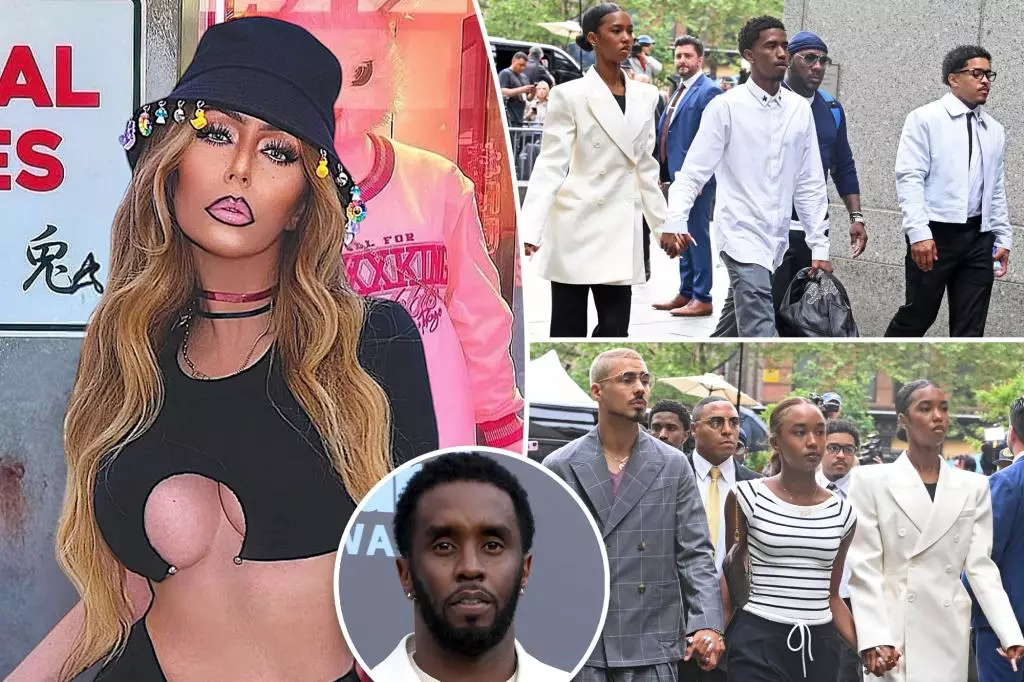Sean “Diddy” Combs stands at the center of a controversial sex trafficking trial that has garnered significant media attention and public scrutiny. Accompanied by his six older children, he has brought forth a spectacle that not only highlights his legal woes but also raises profound questions about parental responsibilities and the ethical implications of involving young minds in such complex and distasteful matters. As the former head of Bad Boy Records, Combs’ legacy is now tainted by the sordid allegations that lie at the heart of this case.
While the legal proceedings unfold, reactions from those who know him, particularly from figures in the music industry, reveal the disconnect that often exists between celebrity lifestyles and societal expectations. Aubrey O’Day, a former artist under Combs’ label, has been notably vocal in her condemnation, calling out the apparent selfishness displayed by a father who subjects his children to the disturbing details of the trial.
The Eye of the Storm: Public Commentary
O’Day’s critique serves as a mirror reflecting the moral dilemmas facing high-profile figures embroiled in scandal. Her statement on the podcast hosted by Amy Robach and T.J. Holmes is particularly striking; she argues that no responsible parent would wish their children to bear witness to the graphic, unsettling testimonies detailing their father’s alleged sexual misconduct. For O’Day, perceiving this spectacle as part of an “optics game” underscores the precarious balance between familial loyalty and ethical awareness.
The notion that the presence of his teenage daughters and other children in the courtroom could serve strategically to manipulate jury perceptions speaks to a greater problem in society: the prioritization of image over integrity. Is this a desperate attempt by Combs to humanize himself in the eyes of the jury, or is it a reflection of his deep-seated narcissism, as O’Day suggests? Either way, such actions raise alarms on multiple fronts, challenging traditional notions of what it means to protect and nurture one’s offspring.
Parental Dynamics Under Fire
The emotional weight of these proceedings cannot be understated. O’Day’s outrage touches on a critical aspect of parenthood: the duty to shield children from life’s harsh realities. Here, the ethical line blurs alarmingly. The supporting role of Combs’ children embodies a painful reality — they are thrust into a situation that demands maturity far beyond their years. The collective notion of family loyalty often comes at an exorbitant cost, both socially and psychologically, and O’Day’s perspective challenges us to examine the true essence of paternal responsibilities.
By involving his children in the courtroom drama, Combs raises yet another troubling question: are children mere props in the broader narrative, manipulated for the sake of public relations? This perspective points to a dangerous cycle where parental influence morphs into coercion. It bears considering whether the supportive presence of these children actually serves their father’s interests at the cost of their own emotional safety and well-being.
Potential Outcomes and Broader Implications
As the trial progresses, the implications of Combs’ actions will extend far beyond the courtroom. The testimonies that emerged, detailed accounts of alleged abuse, transcend the personal and reflect grim social issues concerning consent, power dynamics, and exploitation. O’Day’s commentary brings forward an essential inquiry into the narratives we accept and perpetuate around celebrity culture. When does the pursuit of fame and fortune come at a moral cost?
Moreover, the dynamics of celebrity legal battles illuminate how societal perceptions of justice, accountability, and parental guidance are intrinsically tied to wealth and influence. Much like a high-stakes chess game, the players involved are deliberating moves that could irreversibly alter their lives and those of their loved ones.
In a time when conversations surrounding mental health, ethical parenting, and the responsibilities of public figures are more crucial than ever, the unfolding drama of Diddy’s trial invites observers to reflect and engage. As we watch the trial’s ambiguity play out, it reminds us that the most profound battles often lie in the unglamorous, visceral reality of interpersonal relationships – relationships that can either lift us or plunge us further into chaos.

